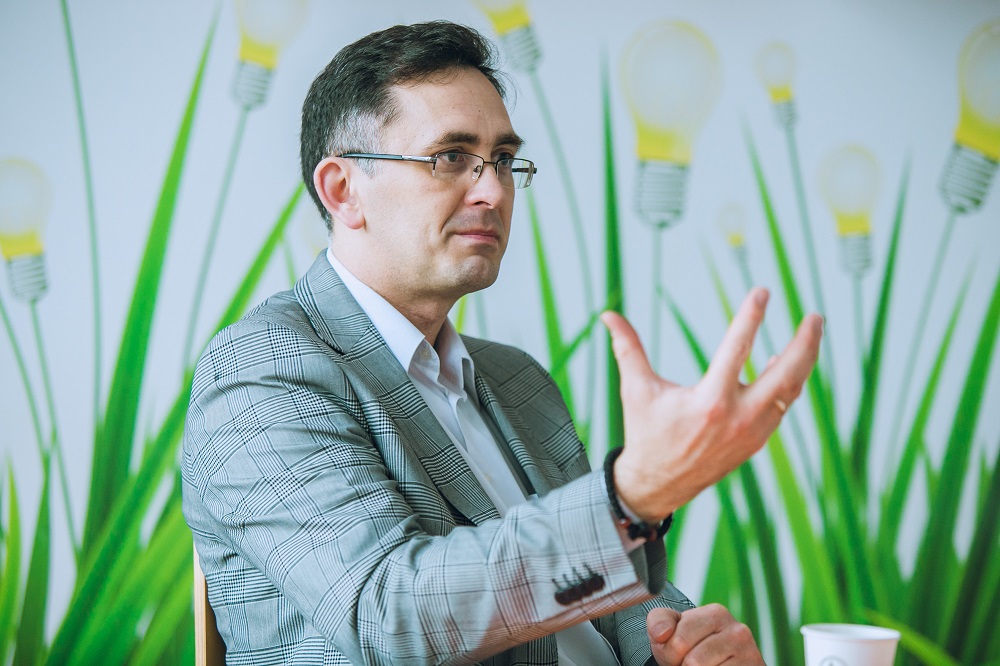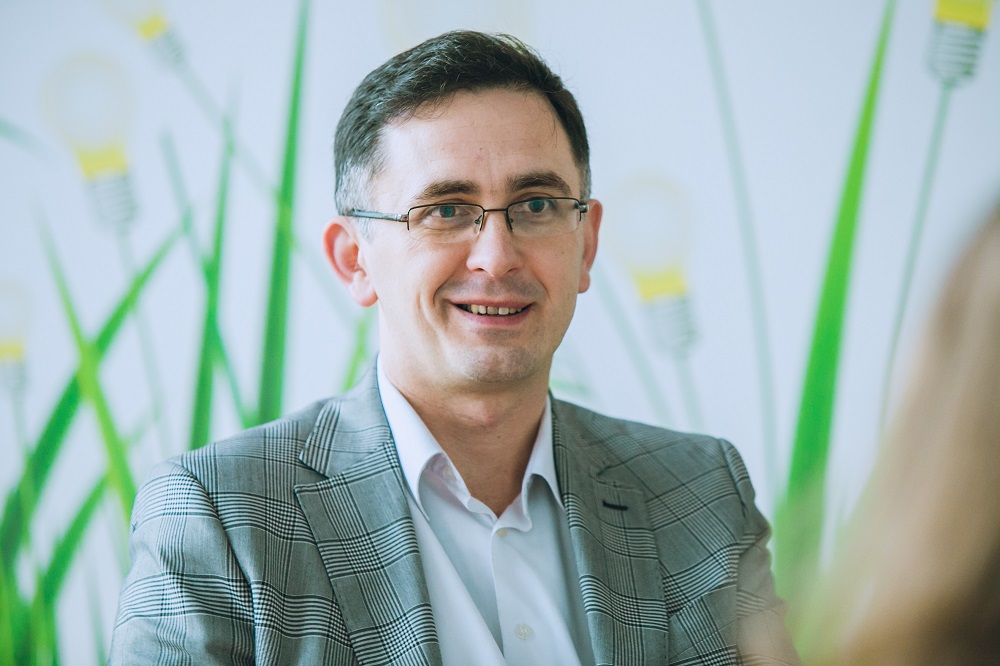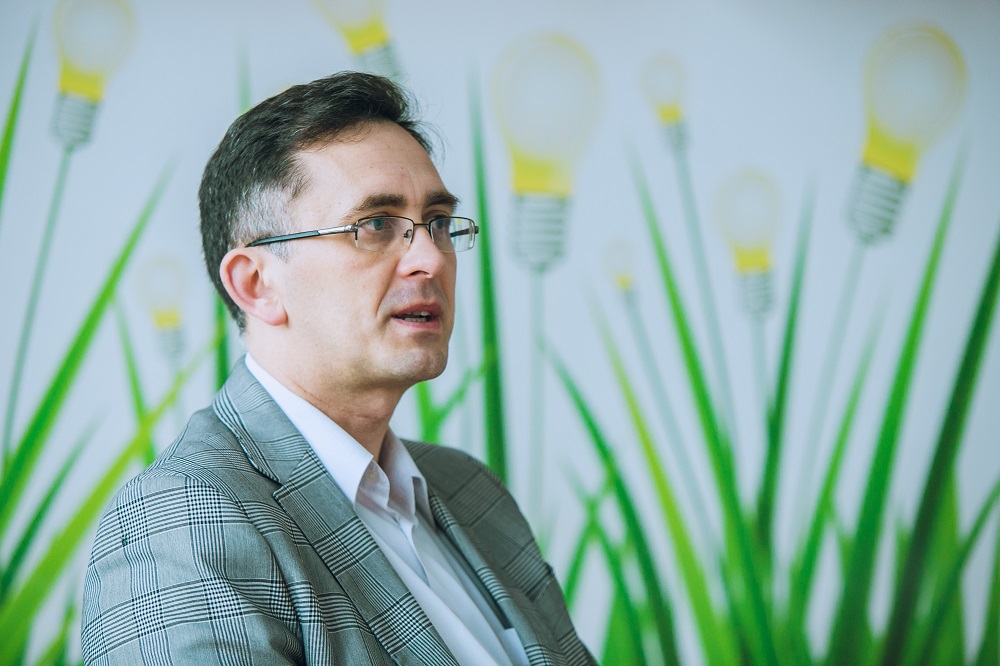The Lviv Business School of UCU (LvBS) is on the threshold of its 10th anniversary. On 11 February, we will gather with the circle of friends to talk about the successes and hopes of the Ukrainian business. But now we are starting to share the stories of people who, at various stages and in different ways, have become part of the history of the School, our achievements, and our dreams.
We have met Volodymyr Turchynovskyi, a member of the LvBS Supervisory Board, dean of the Faculty of Social Sciences of the Ukrainian Catholic University. He is one of the first witnesses to the creation of the School and definitely has something to tell us.

Mr. Volodymyr, what did the Lviv Business School of UCU look like when you got acquainted with it for the first time?
In fact, I was present during the creation of the School from the very beginning. Negotiations of both teams (businessmen and the UCU) continued for almost a year, until the moment the memorandum was signed, and the project started. The UCU managed to combine two Christian principles – establishment of a tradition and respect for sources, on the one hand, and openness to the modern world and people living in it, on the other hand. I do not know whether a business school could have developed in the UCU, and whether it could have become the school we know today, without the dynamics of such a combination.
We received a proposal to create a School from our business colleagues just when the university, after its restoration in 1994, was working on its first 5-year development strategy. It was 2007, and we were ready to open up to new and interesting ideas, although, frankly speaking, back then, we were not really thinking about the creation of a business school. At least, this question definitely was not on our agenda, until representatives of a few large companies (Galnaftogaz, SoftServe, Trottola) came to us to have a conversation about their proposal to found a business school. As I recall, at that time, we asked them, whether they were conducting negotiations with other institutions as well, to which we heard the answer “no”. It was the UCU that they wanted the School to be established in, and they were even willing to wait longer if we could not start this cooperation in 2008. When we were trying to understand where such patience comes from in people who are accustomed to snap and energetic decisions, we heard in response that it is precisely because of the UCU’s atmosphere and values, because of our approach and attitudes towards the world, science, politics, and society, that a business school has to be established here. At that time, the topics of management and business education were a completely new ground for us. “But you have a moral backbone, a worldview, and a remarkable ability to create something meaningful and viable from scratch,” they said. And from that moment it all started, we planned and designed business plans and a start-up strategy together. It was important for us to realize what we want to achieve, and which goals we set for the LvBS.

Sofiya Opatska, who became the first head of the School, was part of this group (who is now the dean and the founder of the School and a vice-rector of the UCU – editor’s note). Even before the start of the project, she was actively involved in the process of forming the LvBS’s vision and strategy.
Finally, one day, we all met in the UCU rector’s office to sign the constituent documents and a memorandum of cooperation and the main principles of operation of the Lviv Business School of UCU. This is how a long, as it seemed to us at that time, year of consultations, thinking, and weighing ended, after which began the daily routine of a “start-up”, formation of a small team, planning of the first recruiting campaign, the first appearances in the media space, and attempts to fill the LvBS atmosphere with the spirit of the UCU’s ethos and values. On some of those early days, Sofiya invited Oksana Kulakovska (who is now the head of the Kyiv UCU Center- editor’s note) to join the project, and this is how we started our first 10 years.
As for the LvBS Supervisory Board that you are part of, when and for what purpose was it created?
It was actually created right away. It included Andriy Khudo, who represented Galnaftogaz company at that time; Oleh Denys, a vice president of SoftServe; Yaroslav Rushchyshyn, a general director of the Trottola OJSC. On the part of the university, there was me and Taras Dobko (who is now the first prorector of the UCU – editor’s note). We understood that, in fact, we did need such an institution; it was an absolutely critical instrument; we met almost every few months, had lots of discussions, put forward hypotheses, and, as a matter of fact, were working our fingers to the bone.
Viewing everything from the perspective of today’s decade, I see that the first years of the School’s establishment and the work of the Supervisory Board were mutually fruiful both for the Lviv business and for the UCU. The business received an attentive and motivated partner that was willing to listen and interact while offering an atmosphere of Christian identity and responsible reflection. And as for the UCU, a channel opened for it through which the energy of responsible, visional, and creative people flowed.
Over time, the team developed, we moved to the issues related to the School’s structuring, formation of the School’s expertise, and the expansion of the educational menu. Today, we are talking about more ambitious plans and vision, about a strategy for the future… When you recall our first meetings of the Supervisory Board, the discussions, the drive and emotions from the first steps, you do not really want to believe that the years of joint work have actually gone by.
You have the backbone, the worldview, and the ability to create something meaningful from scratch
Please, tell us, do you already feel the aforementioned impact on the business environment?
LvBS does a great job in this regard. It blended in the overall university’s philosophy very organically, in the philosophy according to which knowledge, its quality and level, are important, but a moral backbone, worldview, and certain values are equally important. And the intuition of the few first businessmen who approached us in the first year of the School’s operation in order to study paid off. Abilities, skills, knowledge are not some kind of a unique point of differentiation because many people can speak adequately or teach business subjects.

We understand that behind every business, there is a certain dream, a willingness to sacrifice something for its sake. Business is, after all, a relationship with people. The “products” of business (what we usually call them) are in fact the elements of the space of human relations, and your success as a businessman and the success of your product largely depend on your personal motivation and your desire to serve others. Business has its depth, and it is not just a one-dimensional slide along the financial axis. If the business is one of the ways of the implementation of human creativity and the human vocation for serving others, then we inevitably find ourselves in a context created by the topic of human dignity.
The key elements of the school’s atmosphere include respect for others and understanding of the fact that the most important and the deepest things happen to a person when their heart is touched. Such a “pedagogy of the heart” is a significant challenge. It would be much easier to make an “educational conveyor line”.
You can try to shape the brand as you desire, but if it is not backed up by the values which the brand declares, nothing will work out in the long run. The basis of the LvBS brand is primarily graduates of masters programs and various other School programs. Their attitude and signification are the most important things, and they become the main channel of influence and promotion of the school’s brand. Perhaps it is not the fastest channel, but it is a very reliable one, and it is through it that the LvBS communicates its ethos and values. Thanks to the business school, many businessmen came to the UCU for the first time and asked themselves what modern education is, what a university in the ХХІ century is, and what contribution we can make here and now in Ukraine for the global context. Thanks to the business school, we, as a university, have become one of the stakeholders in the dimension of business education, business communications, and business environment. Many topics and discourses that the Lviv Business School managed to launch and cultivate over the past ten years proved to be very conspicuous and engaging for many people in Ukraine and abroad.
You can try to shape the brand as you desire, but if it is not backed up by the values which the brand declares, nothing will work out in the long run. The basis of the LvBS brand is primarily graduates of masters programs and various other School programs.
With regard to plans, today’s mission of the LvBS is as follows: Ukraine on the business map of the world. What will this mission look like in the long run, say, in 5-10 years, in your opinion?
One of our important tasks, which is often emphasized by metropolitan Borys, the president of UCU, is to rethink the ideas and vocations of the university in the ХХІ century. This is a mega-ambitious task. Even on the scale of Lviv, with a barely one percent of all Lviv students, UCU remains a small university, and, after all, we do not set ourselves an objective to have, say, 10% or 15% of all Lviv students on our campus. We get our public capital not from our numbers, but from the scale of our thinking and the courage of decent attitude and faith. Therefore, the business school should ask itself, what do business education and business mean in the ХХІ century? I think that a business school can be one of the global centers where this thinking is put in practice together with international experts, businessmen, public leaders, politicians, and the young generation, to which we pass the responsibility for the ХХІ century.
I would also like to remind that ethics and technology will be one of the important topics. I am convinced that the Lviv Business School of UCU will be more and more focused on ethics in the coming years.

Speaking globally, I think that the main challenge facing people in the world, in which robots that receive citizenship already appear, the number of which (with or without citizenship) will be increasing, will be to preserve and deepen the authenticity of human existence. We must find a way to dive deeper and deeper into the sources of our humanity. We have two scenarios: on the one hand, we can try to compete with robots that are our own creations, and try to become almost the same as they are, by channeling our humanity into the paradigm of artificial intelligence. But I think that this option is definitely a losing one: we will never become better robots than the machines we have created. This is at least because of the fact that what determines our way of life is the relationship and being–in–relation to others, as opposed to connectivity and data transfer, which determine the format of interaction in case of our “digital friends”. Instead, I suggest another scenario which will involve people becoming even more Human, using all that potential of humanity given to them by God.
LvBS is in fact an authentic place where sincere and independent people speak openly and knowledgeably about important and global things.
And LvBS would also have to be mentioned here. What is the specifics of “becoming a person” in the ХХІ century? Where are the sources of humanity that we have not yet discovered or have not learned how to use? What do these questions mean, in particular, when it comes to business and leadership in the business of the new era?
One of the American intellectuals, Thomas Friedman, analyzing the evolution of the labor market, accurately noted that its developmental dynamics is described by three H (Hands, Head, Heart). Our labor market originally consisted of professions which primarily required the ability to work by hand, then the work requiring “head” and “intelligence” came to the fore, and now we are entering the phase of the “heart”, which becomes the point of gravity around which the labor market of the XXI century is formed. Therefore, people must also descend to the depths of their humanity. A “Heart” becomes a point of differentiation of a person in the context of the technologized and “artificially intellectualized” world they have created, and which they must nevertheless master, taking responsibility for it. If we want to be in the forefront of the processes where the future is created, the Lviv Business School of UCU must be engaged together with its experience, resources, attitude and potential, its energy, and humanity of relationships. Then the business – and not only the one from Ukraine – will want to join and become the School’s partner. Because LvBS is, in fact, an authentic place where sincere and independent people speak openly and knowledgeable about important and global things. There is no need to pursue trends, let’s work in such a way that trends are born in the Lviv Business School of UCU.
Prepared by Olena Yankovska. Photo by Bogdan Yemets





















